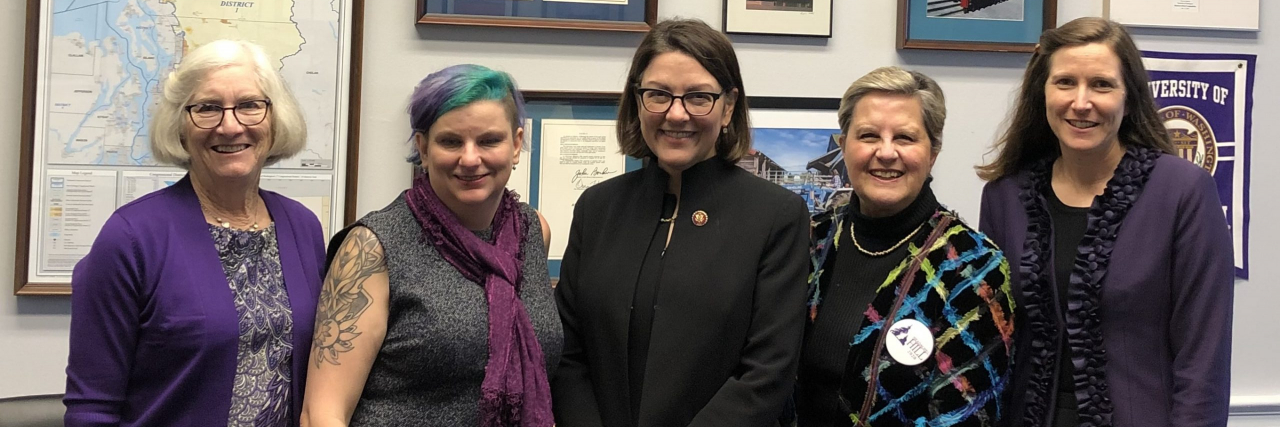June is National Migraine and Headache Awareness Month, a time to learn more about conditions that include migraine, cluster headache, spinal CSF leak, and post-traumatic headache. Many people do not realize that migraine and severe headache conditions are more than just a headache; they are complex neurological disorders. I found that out the hard way.
I had my first migraine attack at age 17. I was told it was just stress. It took eight years to get diagnosed and 15 years before I was prescribed a medication to treat an acute attack, and I only got it because I specifically asked for it. My doctors prescribed preventative medications that were developed for other conditions, without taking the time to explain why they were prescribing them or the awful side effects I might have to endure. When their treatment plans didn’t work, I felt like my doctors blamed me.
Almost every provider I saw prescribed medications at unsuitable doses, or with inappropriate directives for use, or treatments that had no efficacy for my disease. This led my symptoms to increase in frequency, severity, and type.
I have had constant head pain since the year 2000. I developed chronic pain and depression and I have had thoughts of suicide. In addition to head pain, I developed new symptoms including nausea; extreme sensitivity to light, noise, touch, and smells; cognitive issues; tinnitus; neck pain; intense fatigue; and vertigo. I became so debilitated that I had to resign from my job as an elementary school teacher and go on disability. I felt isolated, self-hate, and hopeless.
Twenty-one years after my first attack, I saw a provider who treated me with compassion, who recognized the severity of my disease, and prescribed appropriate care. I also discovered organizations designed to support and educate people with migraine, severe headache disorders, and chronic pain, and my life changed for the better!
My story is not unique, but it should be, so I became a volunteer advocate working for needed change. I volunteer with the Alliance for Headache Disorders Advocacy (AHDA) and meet with Members of Congress and their staff to advocate for equitable federal policies for those with headache disorders during Headache on the Hill. It is in this work that I learned that migraine and severe headache disorders effect American Indians and Alaska Natives at a higher rate than other racial groups, while at the same time, access to neurologists and headache specialists is significantly more limited for Indian Health Services patients. I also learned that veterans of the global war on terror are more likely to develop migraine or other persistent headache disorders than civilians due to service related traumatic brain injuries and exposure to airborne hazards from burn pits.
There are more Native Americans living in California than in any other state. In fact, there are only three other states that have larger Native American populations than Los Angeles County alone. When it comes to veterans, California, Texas, and Florida alternate being the state with the largest veteran population.
It is unfortunate that among the over 20 Headache on the Hill volunteers from California, there is not one person of Indigenous decent nor one veteran of the war on terror. How can my fellow advocates and I effectively share struggles and systemic challenges which we haven’t experienced? For this reason, I urge Indigenous and veteran patients and providers to join AHDA and make their voices heard. Doing as little as sending an email can have a large collective result.
Concurrently, I am concerned that many people, not just Indigenous peoples and veterans, are still struggling like I did my first 21 years with migraine, and they deserve better. I want them to get diagnosed early, to receive effective treatment quickly, and to feel supported and hopeful. With one in every four households affected by migraine or severe headache, it is in all of our collective best interest to commit to support people with migraine and headache disorders while we advocate for better care.
For more information about migraine and headache disorders; to join a support group; find social, educational, mindfulness, and advocacy events; and get training as a migraine and headache advocate please visit the Alliance for Headache Disorders Advocacy, American Migraine Foundation, and Miles for Migraine.

